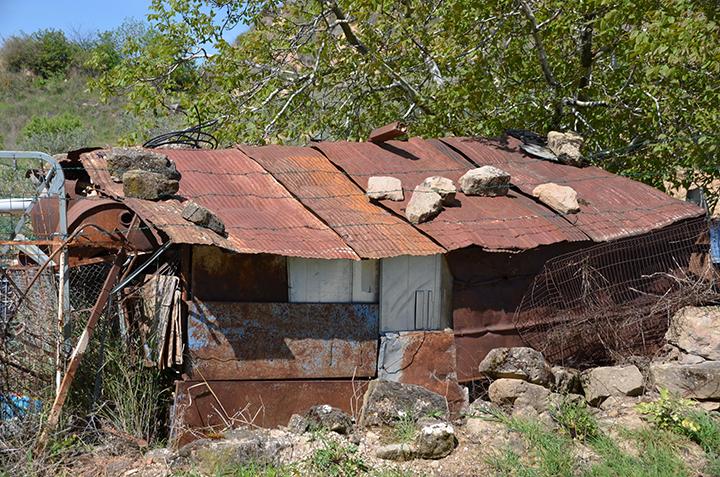| Issue #96 • November/December, 2005 |
When we moved from the city to the mountains, I kept my eyes open and my mouth shut and and paid very close attention to other people’s botchery. Personally, I’d really rather watch someone else screw up than have to do it myself. But of course, there’s no free lunch, and so we added our own blunders to my ever-growing list. What follows are 10 lessons from my “now I know better” collection. Perhaps these lessons learned will ease your transition from the city to wilderness.
1. Know thyselves. If you are a couple who bickers over which way to hang the toilet paper roll, don’t buy raw land.

The path from raw land to indoor plumbing is fraught with hundreds, if not thousands, of decisions. If you can’t pull as a team over the little things, how will your relationship survive decisions like where to sink a well (that one can be worth, oh, $20,000), where to put the kitchen, do we buy or rent equipment, do we build a log house or glue it up out of egg cartons?
We have several guys (one of our neighbors included) sitting around our county amidst their half-finished projects all by themselves because the little woman couldn’t handle it and ran off mid-construction. On the other hand, we have another neighbor couple who knew that they weren’t cut out for the house building process. They bought undeveloped land and put a manufactured home on it. Save your marriage (or whatever) and buy a house.
2. Know thy neighbors. You may be under the false impression that since you are moving from more crowded to less crowded conditions that you will have more privacy and that neighbors matter less. Au contraire.
When looking at rural property, you will find yourself driving down many a dirt road. If there is more than one home on that road, it is a neighborhood, like it or not. Look closely at the homes and residents on that road. If your house catches on fire or you hack your leg off with a chainsaw, do you think you can depend on them to help?
When I was searching the great wilderness for our dream property, I drove down some rural roads that actually triggered the theme from Deliverance in the back of my brain. Filthy, malnourished children standing there picking their noses and glaring at you as you drive by is a bad sign. Find some excuse to go chat up some of the neighbors before you buy. Introduce yourself and ask them how bad the winters are, what advice do they have for new folks, did they marry their sister, whatever, just get a feel for the folks you may have to trust with your life and property.
3. Know thy driveway. I rarely see this subject discussed, but in the sticks, the length of your driveway can make or break the whole experience.
There is a house on our road that has seen three occupant changes in the 4 years we’ve been here. It is a cute, well-landscaped little place with a very short driveway. That means the house is quite close to the DIRT road. When people drive on the dirt road in the summer, the residents of the house, who might be outside enjoying their beautiful yard, get DUSTED. The dust gets everywhere—it covers their cars, it coats their garden, and it creeps into the house, too. Those folks spend their summers in a huff every time someone drives by their house. They make what I call “The Indy Report” to anyone who will listen, “So and so drives fifty miles an hour past our place, blah blah blah.”
On the other hand, our driveway is a winding 700 feet long. We can’t even see the road. We love it. But we also live at about 3000 feet and see a lot of snow all winter. This is OK with us because we have good plowing gear and 4-wheel-drive cars.
It also cost big money to put gravel on that much driveway, which is necessary in our area if you want to use your driveway year-round. We have a neighbor who has been out here for years who had to park at the end of his driveway half the year due to the snow and mud until just last year when he got a 4-wheel drive. A long driveway is great for privacy and air quality, but if you actually want to use it, it will cost you.
4. Don’t share. If you are in such a hurry to move that the only way you can afford it is to “go in on” some property with another buyer, don’t. Americans are lousy candidates for this type of financing arrangement. You may think you are a cooperative, easy-going person until Uncle Wilbur decides to clear-cut five acres so he can raise yaks. If that never happens, great, but the rest of the time the other guy usually wants out at some point, forcing you to come up with the rest of the payment or lose your home and all the work you’ve put into it. I have a collection of local horror stories to that tune.
5. Kill some trees. We are tree-huggers who moved to the woods. As we wandered around gawking at all the pretty trees, we decided where to build our first building, a 24 x 40-foot shop. By now, we were one with the trees and couldn’t bear to part with any of them, so we sited our shop where we could take out the fewest trees.
The trees were happy but we soon saw that the approach to the garage door was too steep to be practical. And we eventually ended up taking out the trees behind the building to cut a road to the well site anyway. So we could have moved the shop back 12 feet or so to a more level spot in the first place. But here we are with an 800-square-foot building in basically the wrong place. So put your buildings where you want them and just plant a few more trees.
6. Do the wave. In the city, avoiding eye contact can be a survival skill. Congeniality can get you shot, or at the very least, panhandled.
Not so in the country. Out here, the wave is the primary social currency. Wave at everybody, whether you know them or not. If you see a guy standing by the road holding an axe dripping with blood, smile and wave cheerily. He might be butchering a deer and may choose to share some with you. You could be making meth in your basement, but as long as you wave and look friendly, people will think you are a good Joe.
If you don’t wave, you could be Mother Theresa and everyone will think you are making meth in your basement. Which leads me to . . . .
7. You will earn a reputation. The reputation is a quaint concept that no longer applies to the concrete jungle. You can be any kind of scuzzball you want in the city and no one cares. In fact, some people think it’s cool and they’ll probably give you your own TV show.
Out here, you will earn a reputation whether you are a hermit who only comes out once every five years or the mayor. You can care about it or not, but if you ever want to do business, or anything else for that matter, your reputation will precede you, so consider how you want to be known. Be aware that anything you say will be held against you and it will also be spread all over town. And it is not cool to be a scuzzball in the country.
8. Guns are part of the culture. Guns are loud. In rural America, people have guns and they shoot them. You may no longer have freeway noise in your bedroom, but it could sound like the Battle of Gettysburg in hunting season.
One of the newer residents on our road is a pacifist-tree-hugger-gun-hater. The next neighbor up from her is an NRA instructor who also tests guns for the pawn shop he works in. Friction is not even the word here. But the problem is that Mr. Guns has every right to shoot all day and night if he wants to on his own land. That’s probably why he lives here. And my guess is the more Ms. Tree Hugger complains about the shooting, the more shooting will happen. If you can’t live with that concept in a rural area, you might be happier either in town, where everyone needs a toilet paper permit to you-know-what, or on a road with (shudder) codes and covenants. At least you know then that your neighbor won’t be raising hogs on the property line and shooting them at three in the morning.
9. Pets—the good, the bad, and the ugly. Out here in the hinterlands the term pet food has a whole different meaning. Sure, it’s great to live someplace where Fifi can run free, but just remember, so do the Fifi eaters. Let’s face it, most of us city transplants grew up on a TV diet of articulate, well-dressed animals. But in reality, cougars, coyotes, bears, and even large predatory birds are all on the lookout for a nice fat Fido or clueless cat to snack on. While the thought of Yogi Bear pick-a-nicking on my cat is too gruesome an image for me to entertain, I’ve been here long enough to know that the risk is part of the natural life of animals. On the one hand, letting our cats in at night seems to be extending their lives and on the other, I’m sure the victims they drag home had families and jobs, too.
And on that same general topic, we had a new guy move into the neighborhood with his own personal pack of about six dogs. He thinks it’s a good idea to let them all run free. Here’s a little tip: Those dogs are not out at the neighbors having tea. Dogs who pack up, chase down wildlife and other people’s animals, and the neighbors shoot them dead. I support that. Actually, I support shooting the owner, but one solution’s legal and the other isn’t.
10. Electricity is not a fact of life. It is the luck of the draw.
We provincials, especially we of the woodlands, are the recipients of periodic phone and power interruptions. Trees fall on lines, aliens sever them with anti-matter beams. The utilities can even go out for no apparent reason in the middle of summer. Maybe it’s just a drill. If you have big, full freezers and no backup, you will be having one hell of a steak feed that night.
We personally are off the grid, so we know when the power is out by the generator noise that resonates through our canyon. Kind of like living near a raceway. Of course, I still lose the phone at times, or it often sounds like someone’s crackling cellophane while I’m trying to talk. In the winter when we’ve had six gloomy days in a row, we have to run the generator ourselves. It all evens out.
So spare yourself the trouble and learn the above lessons from these pages, not when you are sitting on your porch, owing the bank $200,000 or so, cursing your neighbors for actually driving their cars on the road past your house.















Great article! I could identify with so many of your experiences.
Julie Crist is so funny- even while telling the truth!!!
How true .